

Discovery offers new research avenues for fighting this global epidemic. Pathogenic Landscape of HIV. Gladstone Scientists Identify Human Proteins that May Fuel HIV/AIDS Transmission. "Pep Talk" Can Revive Immune Cells Exhausted by Chronic Viral Infection. Home » News & Events » News Releases » » "Pep Talk" Can Revive Immune Cells Exhausted by Chronic Viral Infection Dec. 13, 2011 Adoptive transfer of "trained" immune cells has been applied to cancer and is being examined for chronic viral infections.

Chronic infections by viruses such as HIV or hepatitis C eventually take hold because they wear the immune system out, a phenomenon immunologists describe as exhaustion. Yet exhausted immune cells can be revived after the introduction of fresh cells that act like coaches giving a pep talk, researchers at Emory Vaccine Center have found. Their findings provide support for an emerging strategy for treating chronic infections: infusing immune cells back into patients after a period of conditioning.
Changing the locks: HIV discovery could allow scientists to block virus's entry into cell nucleus. 9 December 2011 Scientists have found the ‘key’ that HIV uses to enter our cells’ nuclei, allowing it to disable the immune system and cause AIDS.

The finding, published today in the open access journal ‘PLoS Pathogens’, provides a potential new target for anti-AIDS drugs that could be more effective against drug-resistant strains of the virus. HIV is transmitted through bodily fluids, primarily infected blood or semen. Once inside the bloodstream, the virus infects key components of the immune system, including cells known as macrophages. It works its way into the nucleus of the macrophages, where it integrates itself into the cell's DNA, allowing it to replicate and spread throughout the body. To access the DNA, the HIV must pass through the nuclear pore complex, a gateway into the nucleus. Building Better HIV Antibodies.
PASADENA, Calif.
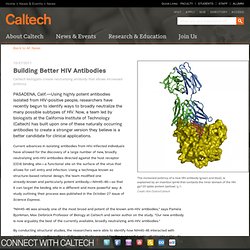
—Using highly potent antibodies isolated from HIV-positive people, researchers have recently begun to identify ways to broadly neutralize the many possible subtypes of HIV. Scientists reveal surprising picture of how powerful antibody neutralizes HIV. Researchers at The Scripps Research Institute have uncovered the surprising details of how a powerful anti-HIV antibody grabs hold of the virus.
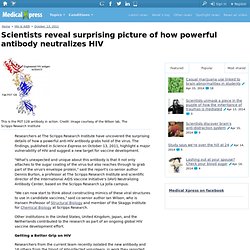
The findings, published in Science Express on October 13, 2011, highlight a major vulnerability of HIV and suggest a new target for vaccine development. "What's unexpected and unique about this antibody is that it not only attaches to the sugar coating of the virus but also reaches through to grab part of the virus's envelope protein," said the report's co-senior author Dennis Burton, a professor at The Scripps Research Institute and scientific director of the International AIDS Vaccine Initiative's (IAVI) Neutralizing Antibody Center, based on the Scripps Research La Jolla campus. "We can now start to think about constructing mimics of these viral structures to use in candidate vaccines," said co-senior author Ian Wilson, who is Hansen Professor of Structural Biology and member of the Skaggs Institute for Chemical Biology at Scripps Research.
Potential new drugs plug brain's biological 'vacuum cleaner' and target HIV. Public release date: 12-Oct-2011 [ Print | E-mail Share ] [ Close Window ] Contact: Michael Bernsteinm_bernstein@acs.org 202-872-6042American Chemical Society.

Distinct AIDS Viruses Found in Cerebrospinal Fluid of People with HIV Dementia. Newswise — CHAPEL HILL, N.C. – When the virus that causes AIDS infects the central nervous system, it can lead to the development of a severe neurological disease called HIV- associated dementia (HAD).

The advent of highly active antiretroviral therapy, or HAART, has helped reduce HAD. But some studies show that HAART may not offer complete protection from less severe HIV-associated neurological problems, nor might it always help to reverse it. As people live longer with AIDS, their risk of developing neurological problems may increase. New research for the first time may have pinpointed a possible explanation for the problem, one that might also help predict who is at greatest risk for HAD. In a study published October 6, 2011 in the journal, PloS Pathogens, one of the two HIV variants found in CSF reproduces in immune system T cells, as does the virus growing in the blood. During their own clinical investigations, Swanstrom’s current collaborators, neurologists Richard R.
Changes in brain function in early HIV infection: A reliable indicator of disease prognosis? Public release date: 6-Oct-2011 [ Print | E-mail Share ] [ Close Window ] Contact: Julia Chapmanjchapman@liebertpub.com 914-740-2100 x2147Mary Ann Liebert, Inc.
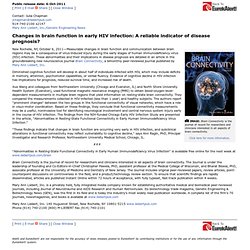
/Genetic Engineering News New Rochelle, NY, October 6, 2011—Measurable changes in brain function and communication between brain regions may be a consequence of virus-induced injury during the early stages of human immunodeficiency virus (HIV) infection. These abnormalities and their implications in disease prognosis are detailed in an article in the groundbreaking new neuroscience journal Brain Connectivity, a bimonthly peer-reviewed journal published by Mary Ann Liebert, Inc. Diminished cognitive function will develop in about half of individuals infected with HIV, which may include deficits in memory, attention, psychomotor capabilities, or verbal fluency. Hide-and-seek: Altered HIV can't evade immune system. Researchers at Johns Hopkins have modified HIV in a way that makes it no longer able to suppress the immune system.
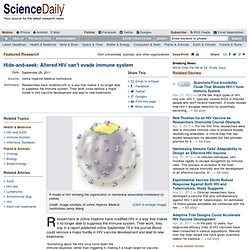
Their work, they say in a report published online September 19 in the journal Blood, could remove a major hurdle in HIV vaccine development and lead to new treatments. "Something about the HIV virus turns down the immune response, rather than triggering it, making it a tough target for vaccine development," says David Graham, Ph.D., assistant professor of molecular and comparative pathobiology and medicine. "We now seem to have a way to sidestep this barrier," he adds. Typically, when the body's immune system cells encounter a virus, they send out an alarm by releasing chemicals called interferons to alert the rest of the body to the presence of a viral infection. When the immune cells encounter HIV, however, they release too many interferons, become overwhelmed and shut down the subsequent virus-fighting response. Targeting HIV's sugar coating: New microbicide may block AIDS virus from infecting cells. University of Utah researchers have discovered a new class of compounds that stick to the sugary coating of the AIDS virus and inhibit it from infecting cells -- an early step toward a new treatment to prevent sexual transmission of the virus.

Development and laboratory testing of the potential new microbicide to prevent human immunodeficiency virus infection is outlined in a study set for online publication in the journal Molecular Pharmaceutics. Despite years of research, there is only one effective microbicide to prevent sexual transmission of HIV, which causes AIDS, or acquired immune deficiency syndrome. Microbicide development has focused on gels and other treatments that would be applied vaginally by women, particularly in Africa and other developing regions. Foldit Gamers Solve Riddle of HIV Enzyme within 3 Weeks. When video gamers armed with the world's most powerful supercomputers take on science and its most vexing riddles, who wins?
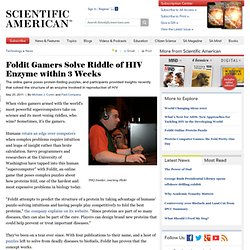
Sometimes, it's the gamers. Humans retain an edge over computers when complex problems require intuition and leaps of insight rather than brute calculation. Savvy programmers and researchers at the University of Washington have tapped into this human "supercomputer" with Foldit, an online game that poses complex puzzles about how proteins fold, one of the hardest and most expensive problems in biology today. "Foldit attempts to predict the structure of a protein by taking advantage of humans' puzzle-solving intuitions and having people play competitively to fold the best proteins," the company explains on its website.
"Since proteins are part of so many diseases, they can also be part of the cure. They've been on a tear ever since. Their latest solution has resolved a problem stumping scientists for a decade. Want to discover the next cure? Game on. German doctors declare cure in HIV patient.